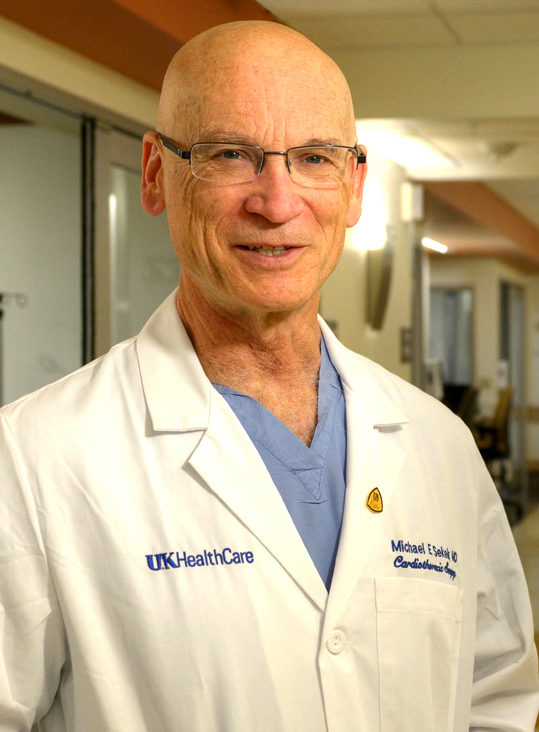Dr. Michael Sekela steps in as new division chief of CT Surgery at UK
The UK College of Medicine and Department of Surgery announced that Michael E. Sekela, MD, officially took over as Chief of the Division of Cardiothoracic Surgery on April 1, 2018. Dr. Sekela succeeds Dr. Sibu Saha, who has held the leadership position since 2013.
Dr. Sekela has a long association with the University of Kentucky. He is a graduate of the cardiothoracic surgery fellowship program and twice has served as faculty. Following his fellowship at UK, Sekela spent two and half years at the DeBakey School at Baylor University, his general surgery residency alma mater. Alongside Dr. George Noon, he served as co-director of Baylor’s cardiopulmonary transplant program. During that time, he was performing major cardiac cases, cardiac and lung transplants, heart lung transplants, and mechanical circulatory support.
Though he was practicing at one of the premiere institutions for cardiothoracic surgery, he and his wife had roots firmly planted in Kentucky. He felt the Commonwealth would provide him something more in terms of a personal vision and a professional surgical practice than he would find in Houston.
“People sometimes refer to the rural atmosphere of Kentucky as a liability. I think they underestimate the quality of the people, particularly those in the eastern part of the state. I grew up on the California coast and I didn’t realize the vitality of Kentucky people until I met them as friends, colleagues, and patients,” Sekela said.
In the early 1990s, Dr. Sekela accepted an appointment with the UK College of Medicine faculty and charged to start and direct the Kentucky Heart, Lung, and Heart/Lung Transplant program.
Sekela led that program successfully for five years, then entered private practice as a partner with Surgical Associates of Kentucky. Remaining at the cutting edge in his field, Sekela adopted and advocated for minimally invasive techniques in cardiac surgery whenever possible. Sekela helped launch the minimally invasive aortic valve program and the robotic cardiac surgery program at Lexington’s St. Joseph Hospital.
When approached to return to the University of Kentucky in 2013, Sekela was quick to build a large practice at UK and emerge as a senior educator in both residency programs (traditional 2 year and Integrated 6 year programs).
As the new CT Surgery chief, one of Sekela’s goals is to establish a strong team of cardiac and thoracic faculty committed to service and education at UK HealthCare. The division has hosted a number of talented young CT Surgeons, but they tend to view their appointment as a stop along a continuum in their professional career, he said. His goal is to establish a long-term career pathway for each faculty member. While he acknowledges that UK HealthCare has made significant strides in terms of its clinical services and education, his goal is to showcase UK’s CT Surgery program as nationally recognized for clinical service, teaching, and research.
As an example of what a core group can accomplish, Sekela cites the continuing success of the UK Transplant Center. The recruitment of cardiac and pulmonary transplant specialists Alexis Shafii, MD and Maher Baz, MD has helped revitalize the program. UK HealthCare continues to exceed itself in numbers of transplants performed in 2015, 2016, and 2017.
“They are on their way to being among the top 15 busiest transplant centers in the country,” Sekela said. “When a program has a stable roster of surgeons, there is a corresponding increase in services and national reputation,” he said.
Such continuity will also enhance the quality of both surgical training programs, he continued.
“Every CT Surgery residency program talks about their patients being the sickest or presenting the most complex pathologies. But even when I was in fellowship, I was taken aback by some of the problems that my patients presented. It’s a humbling experience,” Sekela said. In 2018, the crisis of methamphetamine and heroin addiction has made things worse and is impacting the entire Commonwealth.
Reflecting on his own training, Sekela commented on how the educational programs in CT Surgery have kept pace with new knowledge and emerging technology.
“It’s the nature of medical education to continue growing. Many of the things I learned as a resident no longer hold true,” he said. When teaching residents, a good mentor not only prepares them for the current state of the art, but also gives them a sense of what is coming. At UK, the case volume is higher than ever and the opportunities for residents to learn continues to climb. A surgical academic center must always put the needs of a patient as its highest priority, but with a sense of proper balance with the necessity of training the next generation of surgeons.
“That’s where nurturing a core group of providers become a tantamount concern. At UK, Kentucky’s needs must always come first,” Sekela said.
